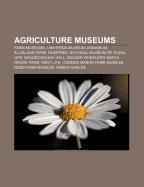Agriculture museums
BücherAngebote / Angebote:
Source: Wikipedia. Pages: 29. Chapters: Farm museums, Universalmuseum Joanneum, Ellisland Farm, Dumfries, National Museum of Rural Life, Shugborough Hall, Seager Wheeler's Maple Grove Farm, Kent Life, Cogges Manor Farm Museum, Ross Farm Museum, Green Gables, Schwarzwälder Freilichtmuseum Vogtsbauernhof, Butser Ancient Farm, Aden Country Park, Greenfield Valley Heritage Park, Muckross House, Riverdale Farm, Lithuanian Museum of Ancient Beekeeping, Milton Keynes Museum, Canada Agriculture Museum, Manor Farm Country Park, Bede's World, Vajdahunyad Castle, Newham Grange Leisure Farm, Mary Arden's Farm, Museum of the Puck Region, Barleylands Farm Museum, Wimpole Home Farm, Motherwell Homestead, Connemara Heritage and History Centre, Agricultural Museum. Excerpt: The Universalmuseum Joanneum is a multidisciplinary museum in Styria, Austria. It has galleries and collections in many subject areas including Archaeology, Geology, Palaeontology, Mineralogy, Botany, Zoology, History, Art and Folk Culture. It is the oldest museum in Austria as well as the largest universal museum in central Europe with over 4.5 million objects in 13 departments and 12 locations in the Styrian cities of Graz, Stainz, Trautenfels, and Wagna (Flavia Solva). To reflect this status and its growth over the last 2 centuries as well as to present a more recognizable image internationally, the Landesmuseum Joanneum was officially renamed to Universalmuseum Joanneum on 10 September 2009. Inner courtyard of the "Lesliehof". Joanneum Quarter under construction - "Neutorgasse" building (right) & the rear of the "Lesliehof" (center-left). Established in 1811 by Archduke Johann, the Landesmuseum Joanneum was Austria's first museum as well as a center for continuing education and scientific research. Notably, the Coin Cabinet and the mineralogical collection were extensive, private collections belonging to the archduke himself and form the spiritual heart of the museum's departments in disciplines from both the humanities and the natural sciences. Around this core of collections, some of the best scientists of the era taught and conducted research, Friedrich Mohs developed the Mohs scale of mineral hardness here and also, a pioneer in paleobotany, plant physiology, phytotomy and soil science, Franz Unger, taught here. In 1864 the Joanneum entered the ranks of the "k.k. technical colleges". Following the decision to raise the institution into the ranks of imperial colleges as well as for organizational reasons and the need for more space, the institution was split in 1887. The college went on to become what is today the Graz University of Technology and the various collections of the Joanneum, both scientific and cultural-historical, were combined into the Landesmu
Folgt in ca. 5 Arbeitstagen
